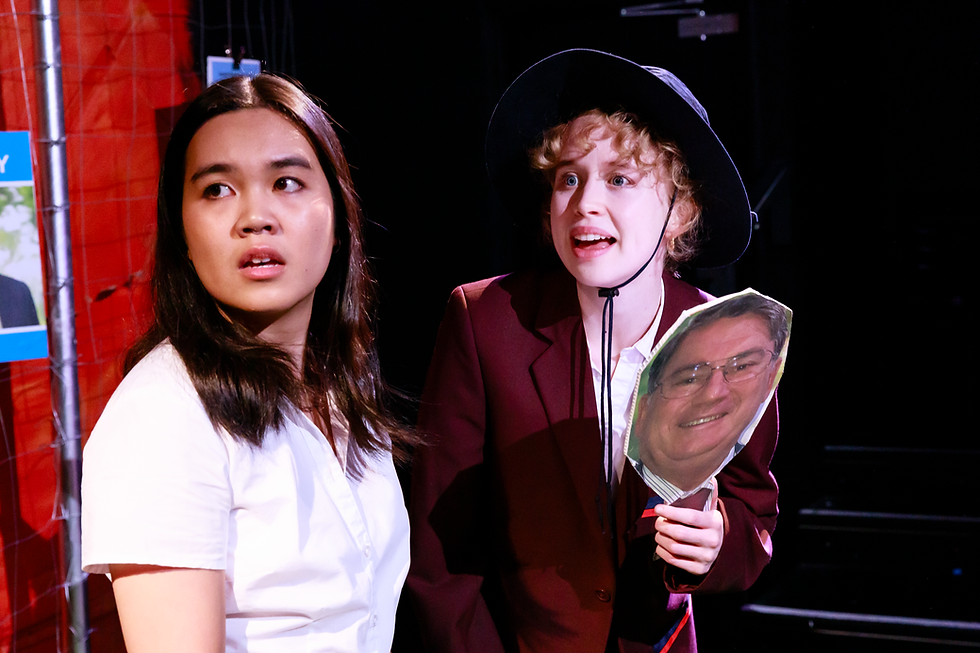The Removalists: Review
- Tayla Ham (she/her)

- Mar 20
- 3 min read
Full of dark humour, edge-of-your-seat suspense and expert pacing, Melbourne Theatre Company's latest play is sure to provoke and impact modern audiences.
“The Removalists” written in 1971, is loosely based on a real story told to the writer David Williamson. The play starts as a cop comedy where fresh face, and fresh out of training Ross (William McKenna) starts his first day. Ross is working in a two man sub-division, with only Sergeant Simmonds (Steve Mouzakis) to keep him company.

That is until sisters Kate (Jessica Clarke) and Fiona (Eloise Mignon) enter the station to report Fiona’s husband, Kenny (Michael Whalley) for abusing her.
Simmonds first tries to brush them off, claiming you can't convict a wife basher while the wife is still warm. It’s a haunting perspective that exposes ingrained misogyny and corruption within the system.
After some time, Simmonds ends up convincing the sisters to work with the police and a Removalist (Martin Blum) to take all her furniture out of the house while Kenny is out drinking on a Friday. When Kenny is unexpectedly home on the night planned for the Removalist's visit, things don't go as expected… showing the full brute force of the law.
While Melbourne Theatre Company have been known to modernise older texts, the Director Anne-Louise Sarks sets this production in the 70’s–when it was written.
It is an effective choice, with design assistance building the era on stage, as we look into themes of police brutality, domestic violence and victims not being believed or taken seriously.
There were only two key sets for this show, and both were beautifully designed by Dale Ferguson. From the typewriters on the police desks, to the perfect period costume design by Matilda Woodroofe, to the endless stream of furniture being moved out of Fiona's house, the era was built impressively on stage.
This careful attention to immersing us in the era sets a striking contrast to our world now–the themes on the stage are eerily relevant to the present day, beyond the stage. As I watch the Australian characters in this play, I am reminded of our reality. 1 in 6 women experience physical or sexual violence at the hands of a partner. Along with Indigenous deaths in custody, and high levels of police shootings being recorded in the last 5 years.
My experience was elevated with the unique staging choice where there was an audience sitting on stage and on the other side of the stage. This put real lives on stage, an idea echoed in the text. This also provided an interesting way for us to observe other audiences members, as well as the characters. A moment where this was absolutely effective was when Fiona revealed her bruises. The audience on the one side of the stage saw the bruises first, meaning the other audience got their reaction before forming their own.
The scene transitions were also staged interestingly but effectively. While it did take some time to get between the police office and the Fiona house, this production utilised the time and brought the makeup artist out and applied the new bruising onto Fiona’s character. This was a brilliant staging direction from Sarks. Set changes in plays can often be tedious, but this production made them captivating—watching the bruises being applied in real time added a raw, unsettling authenticity that enhanced the performance.
The fight choreography by Nigel Poulton was incredibly convincing in most cases.
Steve Mouzakis had an assertive presence across the entire stage, and went straight into the physical fights with Michael Whalley without hesitation. Mouzakis played the commanding role very convincingly, and at times, unsettled us with dark humour in his characterisation.
Both female actors embodied the complexities of domestic violence from both sides of the experience. Jessica Clarke was brilliant at showing exactly how, even today, women often placate and agree with a man like Simmonds to navigate power dynamics. Yet, subtle moments such as her uneasy expressions and discomfort when his back was turned, spoke volumes to her character’s authentic experience.
When this show first premiered, it stunned audiences with its unflinching portrayal of Melbourne's raw and gritty realities. However, what makes it even more shocking today is not just its intensity, but the unsettling realisation of how little has changed. The same issues, the same struggles, and the same harsh realities persist, making this production of The Removalists feel less like a period piece and more like an ongoing reflection of our current society.

Edited by Bridie Middleton.






